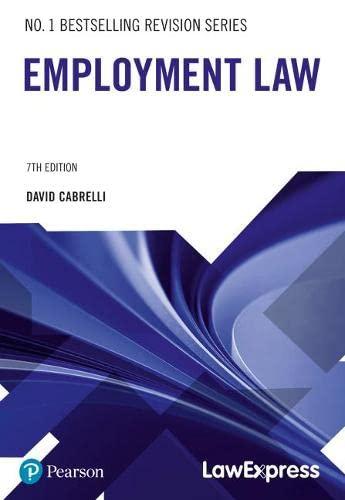Question
The following factual situation is the same as for question 1 (and repeated here for context). Aldoria is a rich, developed country and a member
The following factual situation is the same as for question 1 (and repeated here for context).
Aldoria is a rich, developed country and a member of the WTO. Its population is very sensitive to questions of fundamental human and labour rights. Aldoria has one of the highest levels of labour protection in the world as well as firmly established social safety nets. Shocked by child labour still tolerated in some countries, in particular Borginia and Caledonia, Aldoria imposed a ban on the production, marketing, sale, and importation of all products derived from child labour. Labour unions in Aldoria strongly supported and heavily lobbied for the ban as, in their view, imports made with child labour represent "unfair trade" and a ban levels the playing field, including high production costs linked to producing, in particular, agricultural products within Aldoria.
Aldoria itself has long banned child labour and no product made with child labour has been made or detected in the last couple of decades.
Borginia is a developing country, a member of the WTO, and a major producer and exporter of agricultural products. Borginia challenges Aldoria's ban on child labour products under the WTO dispute settlement system and argues that the manner in which Borginia makes its products, farms its lands and treats its children is none of Aldoria's business. Borginia argues, in particular, that in Borginian society, children become adults as of the age of 14, and that Borginian culture and tradition require children to work, at least part of their time, on the fields and farms of their parents. This practice has been honoured for centuries and it is not up to Aldoria to change this. In addition, Aldoria's ban has had a perverse effect: Since the imposition of the ban, Borginian sugar cane and corn have been blocked from the large and lucrative Aldorian market and increased poverty levels within Borginian agrarian society. This, in turn, has forced many families to take their children out of school for lack of funds.
Problem question 2
Assume Aldoria allows for an exception to its ban for agricultural products from land farmed by traditional communities whose long-standing culture dictates that family members, including children, work at least part-time on the farm, and most products from Caledonia (a member of the WTO) meet this exception whereas products from Borginia do not. This is because the exception is subject to the caveat that the farm must have a turnover smaller than AUD $10,000 per year and most Borginian farms have a turnover above that threshold. Does the ban then violate GATT Article I Most-Favoured-Nation Treatment (MFN)?
Step by Step Solution
There are 3 Steps involved in it
Step: 1

Get Instant Access to Expert-Tailored Solutions
See step-by-step solutions with expert insights and AI powered tools for academic success
Step: 2

Step: 3

Ace Your Homework with AI
Get the answers you need in no time with our AI-driven, step-by-step assistance
Get Started


